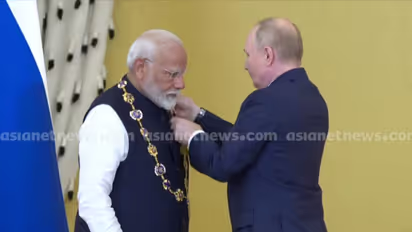Modi-Putin summit propels India-Russia defence equipment collaboration

Synopsis
Russia and India have agreed to establish joint ventures for producing military spare parts and components in India, enhancing the maintenance of Russian-made equipment for India's armed forces. This initiative aligns with India's Make in India policy and aims to expand defence hardware manufacturing for export, strengthening bilateral defence ties.
Russia and India have agreed to create joint ventures to produce military spare parts and components in India. This initiative will help maintain Russian-made equipment used by the Indian armed forces. Additionally, both countries aim to collaborate on manufacturing defence hardware for export, aligning with India's Make in India policy.
This defence agreement, made during the 22nd Russia-India Annual Summit, is seen as a positive step for India. According to a military veteran who spoke to the Russian news outlet Sputnik, the meeting between President Vladimir Putin and Prime Minister Narendra Modi at the Kremlin will help solve a significant security challenge for India.
Laureate of St. Andrew: Modi Honored with Russia's Preeminent Civilian Award despite US Concerns
Retired Brigadier Arun Sahgal, Executive Director of the Forum for Strategic Initiative (FSI) and Senior Fellow at the Delhi Policy Group (DPG), mentioned that India will focus more on maintaining and upgrading Russian systems through Make in India ventures, which might not always be possible with other partners. He believes that co-producing and co-developing defence equipment and spare parts will remain a key aspect of India's military partnerships in the future.
The agreements between India and Russia to produce military spare parts are crucial since 60 to 70 per cent of India's defence equipment is of Russian origin. Despite India's various defence partnerships with other countries, Russia will remain a significant priority in the nation's foreign policy. While India is expanding its defence partnership with the US, especially in critical and emerging technologies, Brigadier(R) noted that there will likely always be challenges in high-tech collaborations with the US.
Start of new diplomatic era: Will Modi and Starmer erase past India-labour tensions?
India has established a working relationship with Russia for cooperation in military technologies, with Russia being very supportive. Sahgal emphasized that India will not choose one partner over the other and is committed to strengthening defence ties with Russia in critical and advanced technologies. Both countries have developed a comprehensive and deep ecosystem in this field.
Potential areas for collaboration between India and Russia include metallurgy and super components. Russia also has much to offer in underwater domain awareness, ballistic missile technology, and space technology. Additionally, India is working on developing jet engine technology domestically, and Russia's advanced engines for the Su-57 fifth-generation fighter aircraft could be another possible area for collaboration.
Modi and Putin to discuss Ukraine, Indo-Pacific bilateral cooperation
Under the Make in India initiative, the country aims to become a leading defence exporter. This aligns with Prime Minister Modi's goal to reduce the cost of importing arms by producing weapons and equipment within the country. Since 2020, India has released five 'Positive Indigenisation Lists', requiring that 500 types of military equipment and 3,000 components and subsystems must be bought only from Indian companies.
Moscow supports India's goal to co-develop and co-produce weapons and platforms through technology transfer agreements, both for domestic use and for export to friendly countries. The first export of BrahMos supersonic missile batteries to the Philippines could serve as a "model" for how India can work with other foreign partners under the Make in India initiative.
Modi-Putin Meeting: Strengthening Strategic Ties Amid Western Disapproval
India and Russia are already collaborating on licensed production of T-90 tanks, Su-30 MKI fighter jets, AK-203 rifles, and BrahMos missiles. They are also working together on the supply of MiG-29 and Kamov helicopters, the INS Vikramaditya aircraft carrier, and S-400 surface-to-air missile systems.\
(The author of this article is a Defence, Aerospace & Political Analyst based in Bengaluru. He is also the Director of ADD Engineering Components, India, Pvt. Ltd, a subsidiary of ADD Engineering GmbH, Germany. You can reach him at: girishlinganna@gmail.com)
Stay updated with the Breaking News Today and Latest News from across India and around the world. Get real-time updates, in-depth analysis, and comprehensive coverage of India News, World News, Indian Defence News, Kerala News, and Karnataka News. From politics to current affairs, follow every major story as it unfolds. Download the Asianet News Official App to stay informed anytime, anywhere.